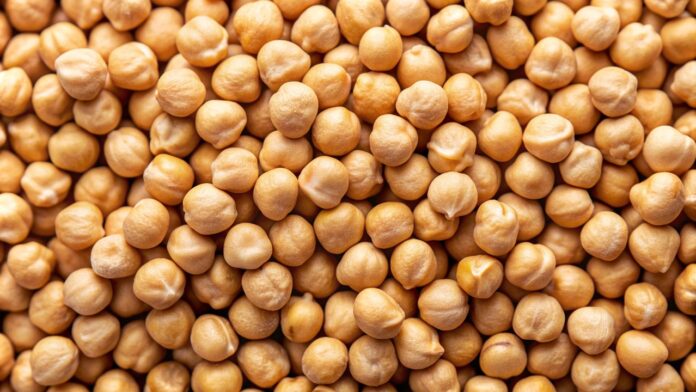New Australian Chickpea Pan‐Genome Set to Revolutionise Crop Resilience
A breakthrough in chickpea genetics promises to transform production not only across the nation, but with particularly significant benefits for Western Australia’s challenging growing conditions. Researchers have unveiled a comprehensive pan‐genome that assembles high‐quality genetic sequences from the 15 most popular chickpea varieties grown by Australian farmers. This pioneering study, published in the Plant Biotechnology Journal and driven by a robust multi‐institutional collaboration, has uncovered previously uncharacterised genetic diversity that could lead to improved yields, optimised flowering times, and enhanced tolerance to both acid soils and drought—a combination of traits vital for WA’s agricultural landscape.
Collaborative Research with Local and National Partners
The study has been carried out jointly by Chickpea Breeding Australia (a collaborative initiative between the Grains Research and Development Corporation and the New South Wales Department of Primary Industries and Regional Development), Agriculture Victoria Research, the WA Department of Primary Industries and Regional Development (DPIRD), the UWA Institute of Agriculture and BGI Research. The research team identified 34,345 gene families, including 13,986 dispensable families associated with key agronomic traits. Among the most promising discoveries is the identification of structural variations that underpin traits such as seed weight, disease resistance, drought resilience, and acid soil tolerance.
Professor Rajeev Varshney, Director of the Chickpea Crops and Food Innovation (CCFI) and corresponding author of the study, explained, “The Australian chickpea pan‐genome marks a significant step in safeguarding future production. It enables us to accelerate the development of chickpea varieties tailored to each region. That could mean varieties that are more drought-resilient and acid soil-tolerant in Western Australia and nationally, and more resistant to diseases like Ascochyta blight.” His comments are echoed by industry leaders who are already sensing the transformative potential of this work.
Addressing Western Australia’s Unique Challenges
For Western Australian farmers, the new pan‐genome brings hope in the battle against environmental and soil stresses that have long hindered crop performance. More than 60 per cent of WA’s agricultural land is affected by acid soils—a constraint that has dictated management practices for decades. DPIRD’s soil science teams have long warned that maintaining sustainable production in these regions requires innovative genetic solutions, beyond the traditional approaches of liming and chemical amendments. By pinpointing genes linked to acid soil tolerance, the new genetic resource may support the breeding of chickpea varieties that perform reliably in the challenging soils of the Wheatbelt and elsewhere.
Equally pressing is the need for enhanced drought resilience. Western Australia has recorded notably lower rainfall over recent years, with projections indicating even drier conditions as climate variability intensifies. The researchers highlighted a “QTL hotspot” region for drought tolerance—a region that has been successfully used to achieve a 15–22 per cent yield advantage in countries such as India, Ethiopia, Kenya, and Tanzania. By introgressing this genomic region into Australian varieties, the project sets the stage for producing cultivars that can maintain productivity under water-limited conditions. As Dr Francis Ogbonnaya from GRDC noted, this landmark investment is pivotal for tackling the pressing challenges of extreme weather and evolving climatic conditions on Australian farms.
Historical Milestones and the Road Ahead
The modern Australian chickpea industry has come a long way since the introduction of the country’s first commercial variety in the 1970s. Over the decades, steady advances—such as the development of moderately resistant varieties against Ascochyta blight—have enabled the sector to grow into a billion-dollar industry, producing over 2 million tonnes of chickpeas last season and establishing Australia as one of the world’s leading exporters. However, market changes, soil constraints and a variety of disease pressures mean that the industry must evolve as quickly as the environment changes.
Dr Kristy Hobson, a keen proponent of advanced breeding at Chickpea Breeding Australia, remarked, “These findings fill in some much-needed knowledge gaps regarding the genetic makeup of Australian chickpea varieties. With this genomic insight, our breeders are better equipped to identify the genes that control yield, stress tolerance, and disease resistance.” The capacity to make these precise genetic selections brings breeding programs into a new era, one where traditional methods are augmented by cutting-edge science to develop next-generation varieties—ideas that resonate deeply with WA’s history of agricultural innovation.
A Global Perspective with Local Impact
International research efforts, such as India’s ICRISAT-led initiatives, have long demonstrated the potential of genomic approaches to transform chickpea production. Yet, the current study is notable for targeting elite varieties already adapted to local Australian conditions. This focus ensures that the advances can be rapidly translated into tangible benefits for growers facing the dual pressures of environmental extremes and market demands. As Western Australia continues to play a crucial role in grain and pulse exports, the introduction of improved varieties with streamlined stress tolerance and increased yield efficiency could secure the state’s competitive position in global markets.
Economic and Environmental Implications
Beyond merely boosting yield potentials, the new genetic insights offer broader economic and environmental rewards. Chickpeas are a key rotation crop that contributes to soil health by fixing nitrogen, thereby reducing the reliance on synthetic fertilisers—a critical factor for sustainable agriculture. Enhanced crop resilience also means lower production risks amid climate variability, reduced input costs for farmers and the potential for improved market returns. For a region that has historically navigated the twin challenges of land degradation and water scarcity, these improvements could well underpin future sustainability and bolster farmer profitability.
Looking to the Future
The pan‐genome initiative has set in motion collaborative efforts to introgress the promising QTL hotspot for drought tolerance into local varieties. The translation from genomic data to field-ready cultivars will require ongoing trials and close partnerships between research institutions and farming communities, ensuring that the technology is refined and ready for real-world challenges. With institutions like DPIRD, UWA, and GRDC playing strategic roles, the research embodies the spirit of cooperation that has long underpinned Australian agricultural achievements.
As Western Australia’s farmers confront the realities of climate change and soil constraints, the new chickpea pan‐genome offers a beacon of hope. By tapping into the genetic diversity developed over decades of breeding—and now expanded by state-of-the-art genomic tools—Australian agriculture is poised to secure its future on both national and global stages.
Sources:
• Plant Biotechnology Journal article – https://onlinelibrary.wiley.com/doi/full/10.1111/pbi.14123
• GRDC Update Paper on the QTL Hotspot – https://www.grdc.com.au/resources-and-publications/grdc-update-papers/tab-content/grdc-update-papers/2020/02/drought-tqtl-hot-spot-region-in-chickpea
• DPIRD Pulses and Soil Management Resources – https://www.dpird.wa.gov.au/pulses
• Murdoch University News Release on Genomic Tools – https://www.murdoch.edu.au/news/articles/new-genomic-tool-set-to-accelerate-development-of-resilient-crops
• Australian Government Agriculture Resources – https://www.agriculture.gov.au

